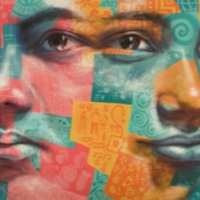
I am from Novosibirsk. At present I live in Omsk because I do not want to be traced. I am seventeen. Half a year ago they kidnapped me. It happened as follows: I was going home, a foreign car approached me, and they put a sack on my head, drew me into the car and then injected me with something. I remember nothing. I do not even remember how they took me away. It seemed as if we were flying or if it was a car, it was shaking. It was dark, like a bunker - they covered me up with something. I only came to when we were somewhere in the East.
[I knew we were crossing the border because] The car stopped. I heard a foreign language, not Russian. But there was no check of the box [that I was in].
No, [I did not have access to food or a toilet] I was locked up in the box all the time. When we arrived, they kept me for three days in a pit. They took away my passport. They set dogs on me, I was beaten on a couple of days and fed with slops. Then, on the fourth day, I was forced to work - to build something, mainly hard work, lugging bricks. But not one by one, but in big quantities at once, they loaded the bricks on me themselves, as many as they wanted.
[I worked for] Half a year.
They woke me at 6 in the morning with a glass of water and a dried crust. Then they drove me to work. In the afternoon they gave something me to eat. At dinner they gave practically nothing. In the evening they drove me back.
They watched [while I was working]. There were no handcuffs, but guards with guns were present, and a supervisor with a stick was there. If somebody fell, he beat then until they stood up and collected the things that they had dropped. There were ten of us. We were not allowed to speak. They kept us in pairs, even at night we weren’t allowed to speak. The supervisors walked around to check that nobody was speaking.
Two men tried to run away, but the punishment was cruel. They beat them with whips. They were hanged up on handcuffs, so high that they stood only on tiptoes. It was not possible to bear for more than 10 to 15 minutes: Either their hand joints broke, or they could stand no longer. I couldn’t bear it any longer. Once they were celebrating something, they got drunk and they forgot to close the lock. I was in that dig-out with another boy, also kidnapped. He was from Perm. Somebody knocked at his door and said that they were friends of his parents, and asked permission to come in. When the boy opened the door, they put a bag on his head and took him away. We two ran away from there. We were running for a very long time.
There was sand, mountains. Mainly bushes, stones. The Far East or South Caucasus. We had been running very long, until we dropped off to sleep. It was night. When we got up, we did not know which way to go and carried on at random. We saw a road and walked along it, there were no cars. We approached a small village, where we then worked a bit at the market - loading boxes to earn money for the bus.
[…]
There was a case where one man ran away, went to the police and the following day the police themselves took him back, because he had neither a passport nor anything. We came to a city by bus, where even the names of cities were written in foreign languages. And then we managed to reach Omsk in a container wagon. The boy with whom I had run away, parted to go home to Perm. As for me, I am still afraid to go home. Maybe they are looking for me, my place of residence is marked in my passport. I am even afraid to let my relatives know. If the police take back fugitives [to their exploiters] and easily cross borders, maybe they have connections even here and they will look for me. So far, I am working here in Omsk at different places, chiefly in a wholesale market, carrying boxes.
[…]
I heard nothing about public organizations. Why would I apply to an international [organization]? I am in Russia. If I had been somewhere in Poland or Germany, I might have applied to the embassy.
[…]
I will hide for two to three years more. Then, probably, I will go home.
[…]
We were dressed very badly, only torn trousers with a belt. We had no shirts or T-shirts. Many of us had short trousers. The local children threw stones and sticks on us while we had dinner.
*name given
Narrative credit to International Labour Organization
Original narrative found in report ‘Forced Labour in the Russian Federation Today: Irregular Migration and Trafficking in Human Beings’









